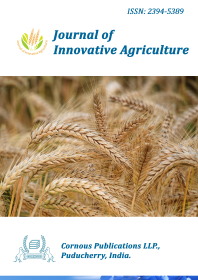
Journal of Innovative Agriculture
Peer Reviewed Open Access Journal
ISSN: 2394-5389 NAAS Rate: 4.05
Submit Manuscript
Peer Reviewed Open Access Journal
ISSN: 2394-5389 NAAS Rate: 4.05
Submit ManuscriptThe present study has focused to analysed determinants at field level climate resilient practices adopted by the vulnerable community in Madhya Pradesh. The model used data of a cross-sectional survey of 681 farm beneficiaries who have benefited under the Sustainable Livelihood for Adaptation and Climate Change (SLACC) project. The SLACC project was carried out in two districts of Madhya Pradesh (Central-India). The 13 logit models were performed which impacts the decision making of the farmers to enhance the exiting farming practice at the field level. Independent variables used for this study are socio-economic variable, credit accessibility, farmland holding, gender etc. which attracts farmers towards sustainable practices. The major finding of this exercises shows a positive relationship between the adoption of ‘line sowing’ of rice and ‘SRI’ (System of Rice Intensification), and the number of years of farming experience The credit accessibility results are positive significant where farmers have to adopt major farm activities like deep ploughing, seed replacement, zero tillage etc. combat the climate change vagaries. More interestingly, organic manure has been adopted by the vulnerable groups higher than the others where results are also validated from the ground level information. The promotions of above interventions require more focus policy driven steps to bifurcate different vulnerable groups under a cluster approach for effective credit diffusion to address Climate Resilient Practices.
Climate Change, Impacts, Adaptation, Sustainable Agriculture, Climate resilient
Aggarwal, P. K., 2008. Global climate change and Indian agriculture: Impacts, adaptation and mitigation. Indian Journal of Agricultural Sciences, 78(11): 911–919. https://doi.org/10.1002/ieam.1253
Census, 2011., Primary Census Abstracts, Registrar General of India, Ministry of Home Affairs, Government of India, Available at: http://www.censusindia.gov.in/2011census/PCA/pca_highlights/pe_data.html, Accessed on 20 october 2018.Commissioner,
Deressa, T.T., R.M. Hassan, C.Ringler. 2011. Perception of an adaptation to climate change by farmers in the Nile basin of Ethiopia. J. Agric. Sci. 149 (1): 23–31. http:// dx.doi.org/10.1017/S0021859610000687.
District Disaster Management Plan. 2016. -Bhind For School of Good Governance & Policy Analysis , Government of Madhya Pradesh , Bhopal Prepared by - Himanshu Rai Guidance - Bhind Administration Technical Consultant – SEEDS India SEEDS Technical Services , 15a , Institutional Area , Sector 4 , R . K Puram ,. (n.d.).
FAO. 2018. India at a glance. Retrieved November 24. http://www.fao.org/india/fao-in-india/india-at-a-glance/en/
G. Singh, A. U. Khan, A. Kumar, N. Bala and U. K. Tomar. 2012. Effects of rainwater harvesting and afforestation on soil properties and growth of Emblica officinal is while restoring degraded hills in western India. African Journal of Environmental Science and Technology, 6(8): 300–311. https://doi.org/10.5897/AJEST11.040
Gore, P. G., T.Prasad and H. R. Hatwar. 2010. National Climate Center office of the additional Director General of Meteorology (Research) India Meteorological Department Pune - 411005, Mapping of Drought Areas over India, (January).
IPCC. 2014. Climate Change 2014: Synthesis Report. Climate Change 2014: Synthesis. https://doi.org/10.1256/004316502320517344
Khatri-Chhetri, A., P. K. Aggarwal, P. K. Joshi and S. Vyas. 2016. Farmers’ prioritization of climate-smart agriculture (CSA) technologies. Agricultural Systems, 151: 184–191. https://doi.org/10.1016/j.agsy.2016.10.005
Knowler, D. and B. Bradshaw. 2007. Farmers' adoption of conservation agriculture: a review and synthesis of recent research. Food Policy, 32 (1): 25–48.
Livelihoods, S. and C. C. Project, 2014). IPP702 V2 Sustainable Livelihoods and Adaptation to Climate Change Project ( SLACC ).
Lobell, D. B. and A. Sibley and J. Ivan Ortiz-Monasterio. 2012. Extreme heat effects on wheat senescence in India. Nature Climate Change, 2(3): 186–189. https://doi.org/10.1038/nclimate1356
Maddison, D. 2006. The Perception of an Adaptation to Climate Change in Africa. CEEPA Discussion Paper No. 10. Centre for Environmental Economics and Policy in Africa. University of Pretoria, Pretoria, South Africa.
Mall, R. K., A. Gupta, R. Singh, R. S. Singh, L. S. Rathore. 2006. Jun06-Water-Cc-Cgc-India-Cursci, 90(12).
Nhemachena, C. and R. Hassan. 2007. Micro-level Analysis of Farmers' Adaptation to Climate Change in Southern Africa. IFPRI Discussion Paper No. 00714. International Food Policy Research Institute, Washington DC.
Patne, B. 2016. District Disaster Management Plan Sheopur In Consultation with.
Prasanna, V. 2014. Impact of monsoon rainfall on the total food grain yield over India. Journal of Earth System Science, 123(5): 1129–1145. https://doi.org/10.1007/s12040-014-0444-x
Sinha, S. K., and M. S. Swaminathan. 1991. Deforestation Climate Change and Sustainable Nutrients Security. Climatic Change, (16): 33–45.
Srinivasa Rao, C., Gopinath, K. A., Prasad, J. V. N. S., Prasannakumar, & Singh, A. K. (2016). Climate Resilient Villages for Sustainable Food Security in Tropical India: Concept, Process, Technologies, Institutions, and Impacts. Advances in Agronomy, 140: 101–214. https://doi.org/10.1016/bs.agron.2016.06.003
Taneja, G., B.D. Pal, P.K. Joshi, P.K. Aggarwal and N.K. Tyagi. 2014. Farmers' preferences for climate-smart agriculture: an assessment in the Indo-Gangetic Plain. IFPRI Discussion Paper 01337. International Food Policy Research Institute, Washington DC, USA.
Venkateswarlu, B. and J. V. N. S. Prasad. 2012. Carrying capacity of Indian agriculture: Issues related to rainfed agriculture. Current Science, 102(6): 882–888.
Walker, B., L. Gunderson, , A. Kinzig, C. Folke, S. Carpenter and L. Schultz. 2006. A handful of heuristics and some propositions for understanding resilience in social-ecological systems. Ecology and Society, 11(1). https://doi.org/10.5751/ES-01530-110113.
